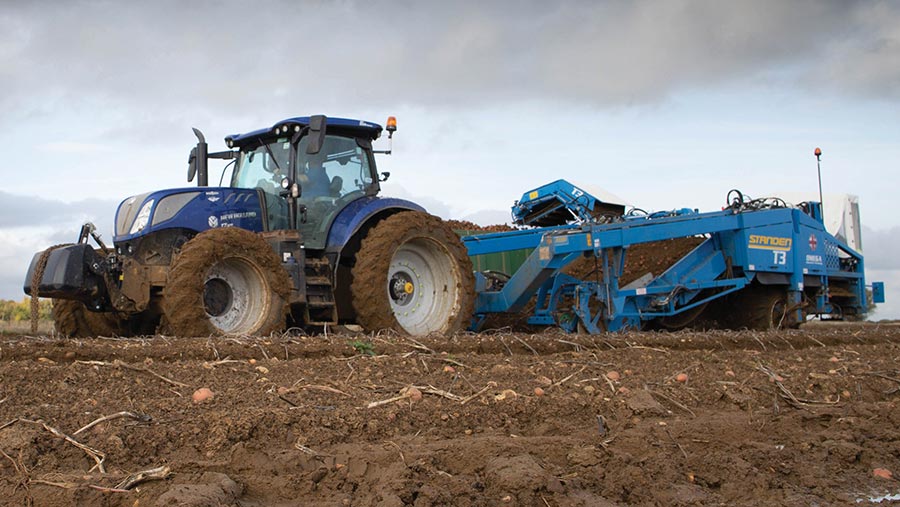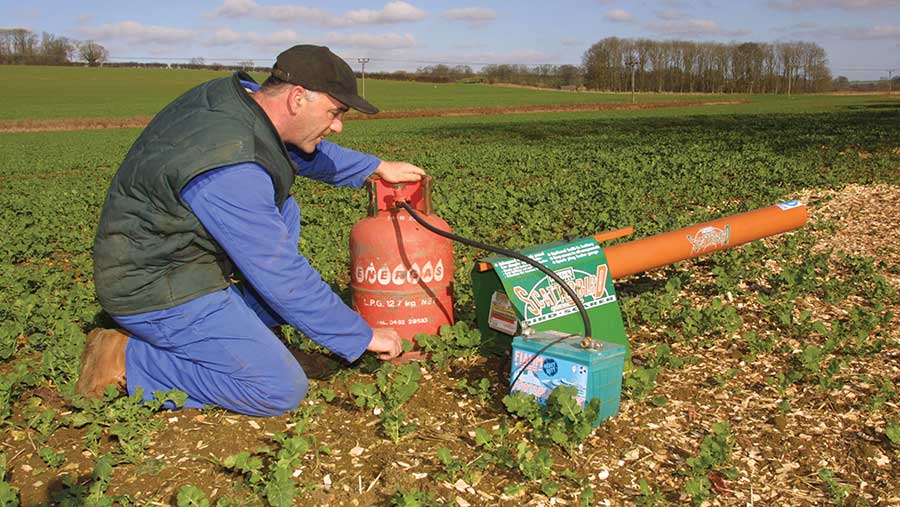Crop Watch: Wet autumn sees rotting seed and missed sprays
 © Tim Scrivener
© Tim Scrivener The wet weather continues and, as one of our agronomists suggests, it is turning into one of the most trying autumns for some years.
Many of the planned autumn operations have not happened, especially in Scotland. Potato harvesting has halted, and some wheat is yet to receive herbicides.
See also: Natural bioherbicides show promise in tackling weeds
East
Becky Finbow
Agrovista (Norfolk/Suffolk)
What a wash out.
Luckily a lot of my winter crops are drilled and sprayed, but I think I am in the minority. Severe flooding in Suffolk a couple of weeks ago and the amount of rainfall not far behind in Norfolk is making it near impossible to travel on the land.
My winter barleys have picked up some chemicals in the waterlogged conditions, but are growing nicely overall.
An application of aclonifen, flufenacet and diflufenican has been applied on fields with problem grassweeds. Although a little hot on the crop, even at the reduced rate, it has done a very good job.
Blackgrass came up lovely and green, but as it continued growing through the residual herbicide layer, it has picked up the chemistry and started to turn white.
With aclonifen’s long half life, effects are still being seen two months after pre-emergence application.
Beet lifting
Sugar beet lifting has gone on hold on heavy land due to the weather. Yields on both light and heavy land had been running at 80-100t/ha, with sugars around the 16% mark.
This year has given beet growers a bit more faith in the crop, and encouraging more to consider growing it next spring.
The delay in beet lifting means that winter wheat is less likely to feature as the following crop, especially if conditions continue to be wet.
But that being said, there is still time for the weather to improve before Christmas, and for more wheat to be drilled. After all, what are these late-drilled varieties for?
The countdown is now on for propyzamide applications in oilseed rape, but at the time of writing (6 October) soil temperatures were still too warm at 11C. The ideal conditions to control blackgrass would be 10C and falling.
Growers who don’t have a soil thermometer can download the Kerb Weather Data app for notifications on when to apply.
The ongoing mild conditions are also increasing disease in oilseed rape crops. Phoma is being found, although not quite at threshold yet.
West
Stephen Harrison
AICC/Southwest Agronomy (Avon)
The miserable weather continues. Losing wellies in the mire is an all too frequent occurrence. Received opinion is that this is the most trying autumn we have seen in years.
Carefully laid autumn herbicide plans are proving difficult to enact. Even though aphids are being found in crops, opportunities to treat are limited. On the plus side, wind and rain mean that aphid flight is limited.
We are now seeing the first tranche of Sustainable Farming Incentive applications agreed. What is noticeable is the area taken out of production. This is before any carbon capture or rewilding initiatives.
Where crops are still to be established, most have resorted to ploughing and drilling straight behind. Wheat seed rates have been raised to 400/sq m.
Slugs are being seen in areas we would not normally anticipate, particularly winter barley, where there is a lot of trash on the surface. Many other situations where slugs were blamed for poor emergence are, in reality, due to waterlogging.
Rotting seeds
Seeds have imbibed too much water during the germination phase and rotted. I fear there will be many patchy crops next spring, and treatment plans will be complicated.
Winter oilseed rape is growing apace. Cabbage stem flea beetle entry scars are present in the majority of forward crops.
It is now too late for applications of growth regulatory fungicides to be worthwhile. Later sowings have required multiple applications of slug pellets.
Our relatively small area of winter linseed on lighter land looks well established and is now about 5cm tall. Tri-allate followed by clethodim has given acceptable grassweed control.
Winter beans range from not drilled to just emerging. On some of the traditional winter bean soil types, any hope of further sowings have been abandoned.
Prospects of a poor crop and no chance of applying propyzamide pre-emergence herbicides are the key factors.
North
Mary Munro
AICC/Strutt and Parker (Perthshire)
The ground is still sodden and arable farmers have achieved very little in the past month.
East Lothian has not experienced the extreme flooding seen further north in Perthshire and Angus, but suffice to say, no one has been able to lift potatoes, and in some places, they cannot see the drills.
The financial losses will be horrendous given the enormous input costs, and the damage to the ground will not be easy to remedy.
Winter wheat is the classic crop to follow potatoes, so it is inevitable that the area of spring barley will be adjusted upwards as a result of the waterlogging.
Needless to say, many of the planned autumn operations have not happened. There are wheat crops that have not been rolled, some that have not had herbicides, and OSR due for Kerb (propyzamide) that will have to wait for an opportunity to get across the land.
Temperatures have not dropped to freezing yet, so it is not too late for this treatment if ground conditions improve, and for my growers, it will be the priority.
Wheat herbicides
It is highly likely that some wheat will have to wait until spring for herbicides. This is never ideal, but Scotttish growers have to plan for wet autumns, and there are several suitable grassweed herbicides that will tackle most of the problem weeds.
Annual meadow grass becomes a nuisance though, as it will tiller through winter, and the spring options can be very hard on the crop.
Slugs, of course, continue to thrive in these conditions and second doses of pellets may well be needed. I shall be looking hard to see if bare patches are due to slug damage or seed rotting out from the wet.
On a positive note, the Christmas tree growers are gearing up for their busy time of year, and the local turkey purveyor is taking orders. Some enterprises are less risky than others.
South
Jamie Swift
Procam (East Sussex)
Where else to start but the weather. There doesn’t seem to be any part of the country that has escaped the recent heavy rainfall, with Storm Ciaran causing havoc in the South.
October saw more than double the average rainfall for the month, putting a halt to any drilling left to do for the foreseeable future unless on high, free-draining ground.
The conversation I’m now having with growers is where to abandon winter cereal drilling and opt for spring crops. That said, many popular wheat varieties such as Skyfall and Extase can be drilled well into December, so a little patience could be the order of the day to allow the storm to pass.
Compared to reports further up country, winter cereal drilling has largely been a success in the South, with early planted cereals now at the two-to-three leaf stage.
As temperatures have fallen in recent weeks, the early aphid pressure has now eased. But slug damage is widespread, especially on heavier land and where growers were not able to roll newly planted crops.
Pre-emergence herbicides have done a good job at holding back early weed competition, allowing good early growth and, despite the now saturated soils and slug pressure, I’m still confident these well-establishing crops will withstand recent storms and enter the winter in good order.
The issue now will be finding a suitable spray day without making a mess to get back to any crops that require a follow-up post-emergence herbicide.

© Tim Scrivener
Oilseed rape
Oilseed rape crops have taken a backseat for now as early disease pressure has not progressed into November after early fungicide applications.
Where able to land and feed, pigeons have taken a liking to any gappy crops, so I’m recommending bangers be deployed to deter this pest and allow plants to establish fully before the winter shut down.
As soil temperatures continue to fall, Astrokerb (aminopyralid + propyzamide) applications are being lined to tackle grassweeds, but again, the weather is dictating when this will be possible.
The latest timing for Astrokerb is before 1 February, so surely a spray window will present itself from now until then.

